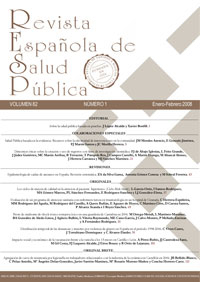Evaluation of a health Care Programme with Nursing Tutor in a Hospital Traumatological Facility in a Hospital. Granada, Spain, 2004
Abstract
Background: The current trend in patient care is towards a more humanized and higher-quality healthcare. The objective of the present study was to evaluate the results of implementing a programme of healthcare with a reference nurse who welcomes the patient at hospital admission, visits regularly during hospital stay, and resolves doubts and problems. Methods: Quasi-experimental study (149 cases and 454 non-tutored controls) in patients admitted for scheduled trauma surgery at the Virgen de las Nieves University Hospital, Granada. Sociodemographic and clinical data were gathered at admission. At 15 days after discharge, patients were administered with an interviewer-administered Zung score and an ad hoc questionnaire on satisfaction with different healthcare aspects during hospital stay and understanding of information received. Bivariate analyses and linear and multivariate logistic regression analyses were performed with a study of confunding variables. Results: For the outcome variable anxiety level non-tutored patiens had a B coeficient of 2.64 (p<0,01) in the multivariate linear regression analisys controlling for the other variables in the final model: sex, presence of informal carer, professional activitiy, days of hospital stay and understanding of health information. For the outcome variable inadequate understanding information non-tutored patients showed an odds ratio of 3.48 in the multivariate analysis controlling for educational level and presence of informal carer. Satisfaction with he friendliness of health care personnel and with the hospital setting did not significantly diference, although the percentage of dissatisfied patiens was higher in the non-tutored group: 15% vs 11% (p=0.34) and 18% vs 12 % (p= 0.11) respectively. Conclusions: The implemented continued care programme proved effective for these patients, increasing their understanding of information received and reducing anxiety levels.Downloads
Published
2008-03-14
Issue
Section
ORIGINALS

